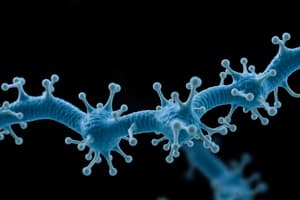Podcast
Questions and Answers
What is the primary role of Antigen Presenting Cells (APCs)?
What is the primary role of Antigen Presenting Cells (APCs)?
- To regulate the immune response through cytokine production
- To produce antibodies against microbial antigens
- To capture, process, and present antigenic peptides to T cells (correct)
- To directly kill pathogens through phagocytosis
Which of the following is considered a 'professional' Antigen Presenting Cell (APC)?
Which of the following is considered a 'professional' Antigen Presenting Cell (APC)?
- Macrophages (correct)
- Fibroblasts
- Endothelial cells
- Activated T cells
Why do T cells require that antigens be captured, processed, and presented in a specific way by APCs?
Why do T cells require that antigens be captured, processed, and presented in a specific way by APCs?
- T cells require the antigen to be displayed on MHC molecules for recognition (correct)
- T cells are unable to directly interact with antigenic peptides
- T cells can only interact with complex microbial antigens
- T cells can only respond to protein antigens, not other types of chemical antigens
What is the primary function of the Major Histocompatibility Complex (MHC) molecules expressed on APCs?
What is the primary function of the Major Histocompatibility Complex (MHC) molecules expressed on APCs?
Which of the following is a key difference between MHC class I and MHC class II molecules?
Which of the following is a key difference between MHC class I and MHC class II molecules?
What is the main function of MHC class I molecules?
What is the main function of MHC class I molecules?
Which component is part of the structure of MHC class II molecules but not of MHC class I molecules?
Which component is part of the structure of MHC class II molecules but not of MHC class I molecules?
What is the role of MHC class II molecules in the immune response?
What is the role of MHC class II molecules in the immune response?
Why do many different peptides bind to the same MHC molecule?
Why do many different peptides bind to the same MHC molecule?
Which type of T cells require MHC class I molecules for activation?
Which type of T cells require MHC class I molecules for activation?
Why is stable expression of MHC molecules important?
Why is stable expression of MHC molecules important?
What is the first step in the antigen presentation process described in the text?
What is the first step in the antigen presentation process described in the text?
Which type of antigens are primarily involved in the process of antigen uptake?
Which type of antigens are primarily involved in the process of antigen uptake?
During their migration to lymph nodes, what happens to dendritic cells?
During their migration to lymph nodes, what happens to dendritic cells?
What is the role of mature dendritic cells in antigen processing?
What is the role of mature dendritic cells in antigen processing?
What occurs after limited proteolysis of antigens to peptides in the antigen presentation process?
What occurs after limited proteolysis of antigens to peptides in the antigen presentation process?
Which step involves the transport and expression of peptide-MHC complexes on cell surfaces?
Which step involves the transport and expression of peptide-MHC complexes on cell surfaces?
What type of cells are responsible for trapping viral antigens circulating in the body fluids?
What type of cells are responsible for trapping viral antigens circulating in the body fluids?
Which antigens are generated within cells as a result of normal cell metabolism or intracellular infections?
Which antigens are generated within cells as a result of normal cell metabolism or intracellular infections?
What type of molecules are histocompatibility antigens, like MHC and HLA?
What type of molecules are histocompatibility antigens, like MHC and HLA?
Which type of antigen is recognized by the immune system in patients with autoimmune diseases?
Which type of antigen is recognized by the immune system in patients with autoimmune diseases?
What class of antigens leads to excessive activation of the immune system?
What class of antigens leads to excessive activation of the immune system?
Which cells can be infected by viruses and present some antigens that can trigger an immune response?
Which cells can be infected by viruses and present some antigens that can trigger an immune response?
What is the defining characteristic of high molecular weight antigens?
What is the defining characteristic of high molecular weight antigens?
What is the role of a carrier molecule for a hapten?
What is the role of a carrier molecule for a hapten?
Which of the following is NOT a property that makes a molecule an effective antigen?
Which of the following is NOT a property that makes a molecule an effective antigen?
What is the term used to describe the immunologically active regions of an antigen that bind to lymphocyte receptors or antibodies?
What is the term used to describe the immunologically active regions of an antigen that bind to lymphocyte receptors or antibodies?
What is the defining characteristic of low molecular weight antigens?
What is the defining characteristic of low molecular weight antigens?
Flashcards are hidden until you start studying




